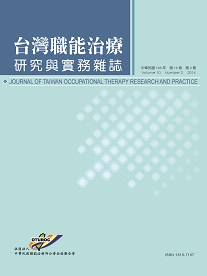Journal of Taiwan Occupational Therapy Research and Practice

半年刊,正常發行
治療師對於泛自閉症障礙兒童之評估,須付出較多的心力,主因是泛自閉症障礙兒童在人際互動、溝通及行為方面的能力缺失,而且個案間之異質性大。但目前臨床上常用之評估工具無法適當地評估此一族群之能力及表現,使得評估的結果常無法具體量化個案之特性,亦難以客觀呈現個案之進步量,因此臨床上極需具良好信效度之標準化評估工具。心理教育量表(Psycho-educational Profile, PEP)為針對泛自閉症障礙兒童的標準化具常模評估工具,已在歐美使用多年,並可根據結果產生個別化的訓練計畫,應可做為臨床上良好之評量工具。第三版之心理教育量表(PEP-3)依據近期臨床使用經驗及研究結果增加了新的題項,尤其在社交及溝通領域,並且將過時的題項刪除,計分系統做出更清楚的定義,信效度部份亦經過初步驗證,並增加了照顧者報告提供更完整的訊息。本篇整理PEP-3之發展過程,心理計量特性,並給予使用者以及未來研究方向之建議,以提升專業人員對此工具之認識。
Children with autism spectrum disorders (ASDs) have impairments in communication, social interaction and behavior, and therefore their evaluation requires highly individualized attention, though the typical assessment tools are inadequate. Applying regular standardized measures on children with ASDs is limited. In clinical setting, such a flaw hinders practitioners from reporting quantitative evaluation results and monitoring the progress of the children. An assessment tool with sound psychometric properties for assessing children with ASDs is warranted.The PsychoEducational Profile (PEP) is an assessment tool designed for children with ASDs, and the PEP is internationally renowned and with sound psychometric properties. It provides information on developmental skill levels and information useful for individualized treatment program. PEP-3 porvides an easier accessibility. In addition to the new, added dimensions, the function domains have been revised to reflect current research and clinical concerns, especially in the area of social and communication functions; obsolete ones were deleted, the scoring is clearly defined. We review the related articles of PEP-3, summarize its psychometric properties, and provide some suggestions for future clinical evaluation and research. Hope to enhance therapists' understanding of this assessment tool.












